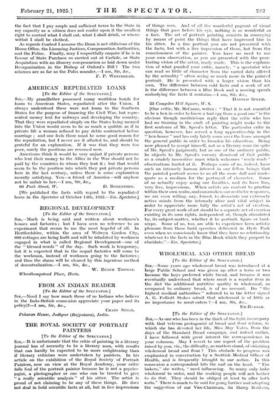THE ROYAL SOCIETY OF PORTRAIT PAINTERS
[To the Editor of the SPECTATOR.] is unfortunate that the critic of painting in a literary journal has of necessity to be a literary man, with results that can hardly be expected to be more enlightening than if literary criticism were undertaken by painters. In his article on the exhibition of the Royal Society. of Portrait Painters, now on view at the Royal Academy, your critic falls foul of the portrait painter because he is not a psycho- logist, a photographer or one who can be trusted to give " a really scientific analysis " of his sitter. The artist is proud of not claiming to be any of these things. life does not deal in bold scientific facts at all, but in live impressions
of things seen. And of all the wonderful pageant of visual things that pass before his eye, nothing is so wonderful as a face. The art of portrait painting consists in conveying by means of paint the things that have impressed him in his sitter. In a fine portrait you are not presented with the facts, but with a live impression of them, hot from the consciousness of the painter. You have no need to use your own observation, as you arc presented with the pene- trating, vision of the artist, ready made. This is the explana- tion of what puzzled your critic, namely, " a spectator who can read so little of character from the varied data offered by the actuality " often seeing so much more in the painted portrait. He is presented with a larger vision than his own. The difference between cold facts and a work of art is the difference between a Blue Book and a moving speech embodying the facts it contains.—I am, Sir, &c.,
HAROLD SPEED.
23 Carnpden Hill Square, W. 8.
[Our critic, Mr. MeCance, writes : " That it is not essential to be a hen in order to know a bad egg from a good one " is the obvious though meritricious reply that the critic who has had no training in the craft of painting might make to the first sentence of Mr. Speed's letter. The particular critic in question, however, has served a long apprenticeship in the " hen-house " and has only lately come over the fence amongst the general public in order to broaden his education. Being now pleased to accept himself, not as a literary man (in spite of Mr. Speed's judgment), but as one of the ordinary public, he objects to Mr. Speed's cursory dismissal of that public as a crudely insensitive mass which welcomes ready made ' observations hurled at it. Perhaps some of us, indeed, have such an intensely human interest in our fellow beings that the painted portrait seems to us all the more dull and inade- quate as a medium for the portrayal of character. Some of us actually enjoy using our faculties, and do have live, very live, impressions. When artists are content to practise within their own realm, and can awaken our aesthetic responses, we are even willing, nay, forced, to dissociate our extremely active minds from the intensely alive and vital subject in order to appreciate more fully the artist's act of creation. For every great work of art should be a separate act of creation existing in its own rights, independent of, though stimulated by, its subject-matter, whether it be portrait, figure or land- scape. Some of us, too, are able to experience keen artistic pleasure from those lurid speeches delivered in Hyde Park even when we consciously know that they have no relationship whatever to the facts in the Blue Book which they purport to elucidate."—En. Spectator.]










































 Previous page
Previous page